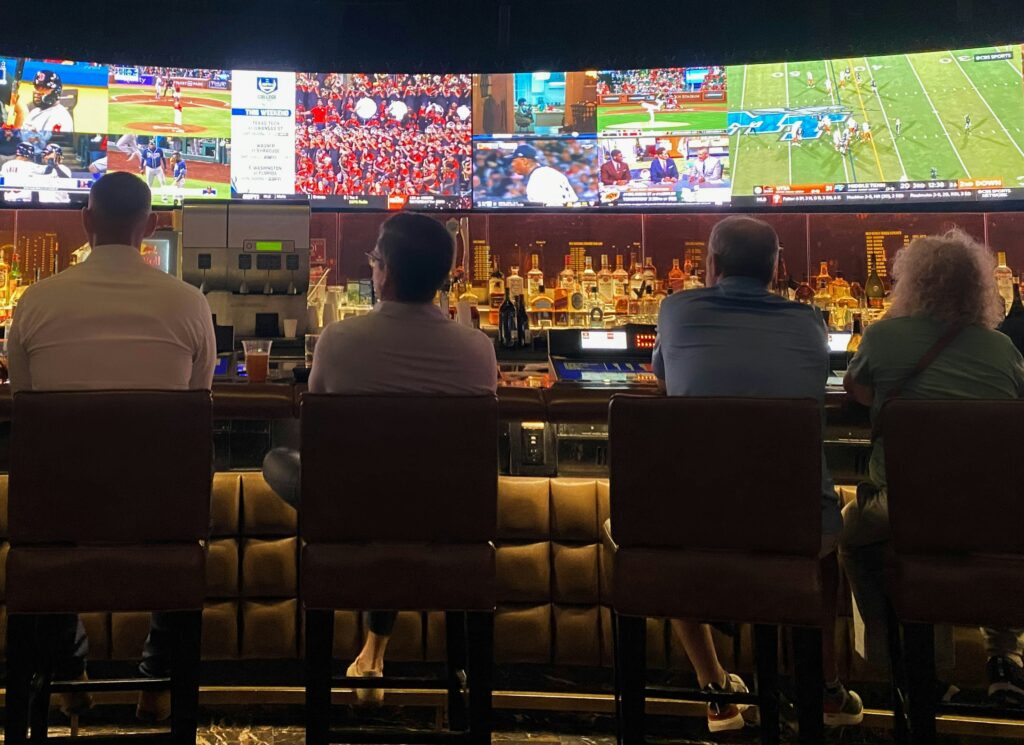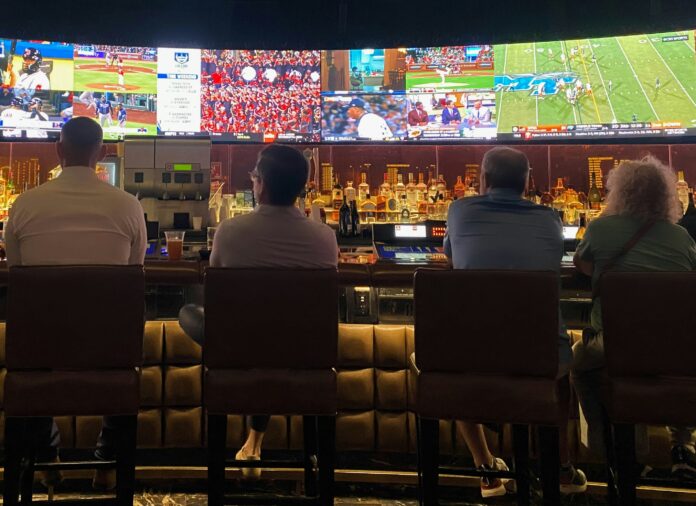The NBA finals may already be in the backseat, but nostalgic viewers and fans of the game lament the conspiciously missing NBA Finals logo that some people felt less championship vibes on live NBA games.
While the league previously used on-court decals for the Finals and the Larry O’Brien Trophy, they were removed a decade ago due to safety concerns of being slippery. But what’s become more common sight is the presence of betting ads egging fans to add a new layer of excitement by placing betts on odds based on certain stats such as points scored, minutes played and many other game stats.
The rise of sports betting and the relentless march of commercialism in professional sports are reshaping every aspect of the game. From how fans experience the action, to the pressures on players, to the very soul of what sports mean to society we all are witnesses to this transformation.
In Australia, betting is deeply ingrained in its culture. Melbourne Cup, for instance, attracts enormous betting activity each year. It’s estimated that 61% of Australians who gamble have placed a bet on the “race that stops the nation”, spending an average of $85 each. On Melbourne Cup Day, betting is so widespread that even people who rarely gamble will have a “flutter,” often as part of workplace or family sweepstakes. The tradition is so strong that tote betting, particularly via TAB terminals in pubs and clubs, sees a massive spike on Cup day.
Other cultural touchpoints include informal bets are common during ANZAC Day, when traditional game such as two-up are sometimes played in pubs, and betting accompanies these games.
But even for a non-betting population, the ubiquitous physical access of electronic gaming machines or pokies are accessible on pubs, news stands, and hotels. Online terminals or betting kiosks are common, making it very convenient for anyone visiting a local venue to place a bet.
For those who are not to close to these premises, smartphones provide instant access to sports betting, casino games, and racing markets wherever they are. Signing up requires minimal information and time. Physical venues don’t require registration or ID for most forms of betting, besides routine age checks.
Driven by the legalization and mainstreaming of gambling in the United States and elsewhere, sports betting has occupied a significant portion. What was once a niche, often underground activity is now a multi-billion-dollar industry, with betting odds, prop bets, and live wagering featured prominently during broadcasts.
There are so many players in the industry — Sportsbet, TAB, Bet365, Draft Kings, FanDuel, BetMGM, ESPN BET and the list goes on — that each one presents enticing offers such as welcome bonuses, free bets, and other incentives to attract new participants, including those who have not previously bet. This persistent marketing normalizes betting as a mainstream leisure activity that encourages trial.
If that’s not enough, these companies tap on celebrity popularity to stand out in the competitive market. For example, Caesars Sportsbook featured the Mannings family (Peyton, Eli, Archie) in major national campaigns and FanDuel has partnered with famous NFL athletes.

Influencers, including sports journalists and podcasters, are paid to promote betting platforms through personalized codes, reviews, and betting picks. Sponsoring viewing parties, and pop-up experiences at sports bars and local events create brand engagement away from screens. Brands like FanDuel also develop memorable slogans (“Make Every Moment More”) or adopt mascots like Caesars Sportsbook using a Roman Emperor character to retain top of mind attention.
Then there are official partnerships with professional teams in the NFL, NBA, MLB and NHL, ensuring prominent logo placement in arenas and stadiums and exclusive branding rights. These deals also include special in-game promotions and branded experiences for fans. Several major US betting companies have also secured naming rights or built branded areas/sportsbooks inside major arenas and stadiums.
Table of Contents
Commercialism takes center court
The invasion of betting into everyday life is impossible to ignore: ads for Sportsbet, TAB, and ESPN Bet are everywhere: flashing across TV screens, blaring from radio spots, plastered on billboards, and dominating social media feeds from influencers.
Online, banners and pop-ups for sportsbooks appear relentlessly on YouTube ads (with no skips allowed, mind you), fantasy sports platforms, sponsored podcasts and video episodes, and even within sports highlight reels. It’s borderline annoying to casual sports fans and already alters the game experience watching them live or on screen.

Their is designed to normalize betting, making it seem fun, harmless, and a natural part of the sports experience. The result is a cultural shift where the language of odds, parlays, and “risk-free bets” is now as familiar to fans as the rules of the game itself.
For broadcasters and leagues, this is a golden opportunity. Sports betting drives engagement, keeps viewers glued to their screens, and opens up lucrative new revenue streams. Advertisements for sportsbooks, odds updates, and betting promos are now as much a part of the broadcast as the game itself. But this transformation comes at a cost.
Sports betting has become a major revenue driver in professional sports, significantly contributing to the growth of salary caps, player salaries, and the value of TV rights. Leagues and teams now generate hundreds of millions through partnerships with betting companies, integrated sponsorships, and in-stadium betting lounges.
As league revenues grow, partly fueled by this influx, salary caps rise, allowing for higher player salaries. Betting also enhances viewer engagement during live broadcasts, making sports content more valuable to broadcasters and advertisers, which has driven up the cost of media rights.
The impact of sports betting to professional athletes
As the main performers of sports entertainment fans are rooting for, the rapid growth of sports betting has significantly impacted professional athletes, amplifying both positive exposure and negative pressures. While betting partnerships contribute to higher salaries and increased media attention for players, they also bring increased public scrutiny and performance pressure, as fans with money on the line can become intensely critical or even threatening when outcomes aren’t favorable.
In the past, athletes were judged by their performance on the court and their conduct off it. Now, they are also subject to the scrutiny and ire of bettors who have a financial stake in every outcome. A missed shot, a turnover, or a late-game foul can spark a torrent of abuse on social media from fans who lost money. Players are increasingly harassed by bettors, who feel entitled to vent their frustrations directly at the athletes.
There have been multiple high-profile cases of athletes disciplined for violating gambling rules, such as NFL players Calvin Ridley and Josh Shaw being suspended for betting on games they were connected to, and NBA player Jontay Porter admitting to manipulating his game performance as part of a gambling scheme to pay off debts.
In the NHL, Ottawa Senators forward Shane Pinto was suspended for 41 games in 2023—the first modern NHL player penalized for gambling violations—after an investigation found he allowed a third party to access his sports betting account, though there was no evidence he bet on NHL games himself.
There’s also an alarming trend of athletes facing threats from disgruntled fans, as seen with Houston Astros pitcher Lance McCullers Jr., who received chilling death threats—including against his children—from an intoxicated overseas bettor after a poor performance.
Online abuse and threats directed toward athletes are increasing as mobile sports betting grows in popularity. https://t.co/m6ikMf5i6u
— masslivesports (@masslivesports) June 3, 2025
The accessibility of online gambling and rising player debts have made some athletes more vulnerable to exploitation, coercion, and match-fixing attempts from criminal elements. Athletes have also been targeted by gamblers with abuse and threats, particularly following financial losses by bettors, adding a layer of mental stress to their professional lives. This complex environment threatens both individual well-being and the integrity of sport.
The impact to fans: more engagement or greater exploitation?
Sports betting has revolutionized the way many fans engage with sports, offering heightened excitement, more analytical involvement, and new ways to connect with games. The accessibility of online platforms and in-play betting has made it easy for fans to have a stake in the outcome of virtually any event, often making them more likely to watch live broadcasts and follow player stats closely.
For many, having “action” on a game adds to the thrill and intensity, deepening their emotional and financial investment in both major events and otherwise less compelling matches. Sports betting has also contributed to increased revenue for leagues and media, while helping to maintain television viewership in an era of shifting media consumption habits.
However, the normalization of betting has brought notable downsides, transforming fandom for some into a transactional, betting-centric experience where financial risk can eclipse the pure enjoyment of rooting for a team. Fans who lose bets often experience decreased engagement and negative emotions, undermining the positive aspects of sports participation.
There is also evidence that problem gambling is more prevalent with features like in-play betting, and that the emotional highs and lows associated with wins and losses can become extreme—sometimes leading to harmful gambling behavior and negatively impacting well-being.
The culture around sports fandom is shifting: for many, watching no longer feels complete without a bet, blurring the lines between entertainment and gambling, and, at times, replacing traditional loyalties with financial interests.
Gambling addiction is a rapidly growing problem, especially since the legalization and expansion of online sports betting. In the U.S., the number of states with legal sportsbooks has soared from 1 in 2017 to 38 in 2024, and total wagers exploded from $4.9 billion in 2017 to over $121 billion in 2023—94% of which was placed online. This surge has driven unprecedented demand for gambling addiction support, with research showing a 61% increase in help-seeking after online sportsbooks launched compared to a 33% rise after retail sportsbooks were introduced.
Approximately 5 million Americans meet the criteria for compulsive gambling, but only about 8% seek help, and men are twice as likely to be addicted as women. Major sporting events like March Madness see up to 68 million Americans planning to bet billions. In Australia, where gambling losses are among the world’s highest, over 40% of regular sports bettors experience gambling-related problems such as financial harm, mental health issues, and negative social consequences.
This addiction has wide-reaching impacts on society: individuals and families face financial distress, relationship breakdowns, poor work performance, and increased rates of mental health problems, including anxiety, depression, and suicide risk.
The normalization and aggressive advertising of gambling especially through online channels and during live sports—make it more tempting and accessible, particularly for younger people who are showing the fastest growth in problematic gambling.
Experts are calling for urgent public health reforms: better funding for addiction services, stricter advertising controls, clinical training for healthcare providers, safeguarding online betting platforms, and public education to prevent gambling harm and reduce stigma. Without intervention, the continued rise in sports betting is projected to magnify these social costs and public health challenges.
The future of sports betting and where we are heading
The trend in sports betting is sharply upward, with the global market projected to double from roughly $108.9 billion in 2024 to nearly $200 billion by 2030, driven by expanding legalization, rapid advances in mobile technology, and AI-powered personalized experiences. The digital revolution, especially the rise of mobile betting, live/in-play wagering, and seamless app integration, is making betting more accessible and engaging for users everywhere.
Leading sports and markets, such as football and tennis, fuel this momentum, while new verticals like eSports and microbetting attract younger audiences.
On the innovation front, betting companies are investing heavily in real-time analytics, machine learning, and even virtual reality to deliver ever more dynamic and interactive betting experiences. While regulatory and responsible gambling concerns remain, the sector’s major growth engines are convenience, technological advancements, and the ongoing cultural integration of betting into global sports fandom.
As smartphone adoption and 5G networks spread, the reach of online sports betting is set to expand further, including in emerging markets, cementing its central role in the future of sports entertainment.
During periods of instability, betting platforms may see increased interest as individuals seek entertainment or financial distraction but this is a temporary remedy, if at all.
When I buy a Powerball or Weekly Windfall ticket, I know I won’t beat the odds—but I’m not really buying a chance to win. I’m buying the right to dream. For a moment, I get to imagine the house I’ll own, the trips I’ll take, the life I’ll live. The odds? One in 134 million for Powerball. One in over 8 million for Weekly Windfall. But hope, however fleeting, comes with every ticket. And for many other dreamers, that’s worth the price of admission.

